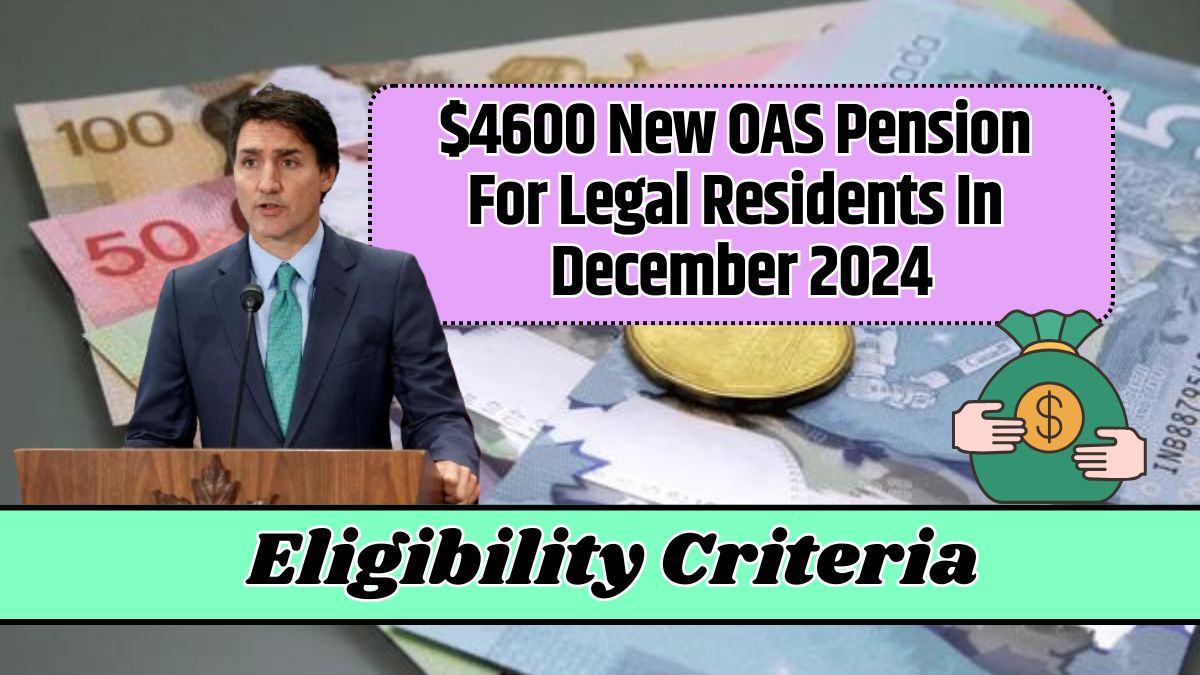Canadian seniors could see a significant increase in their Old Age Security (OAS) benefits, with Prime Minister Trudeau’s proposed $4600 monthly OAS pension.
This initiative aims to alleviate the financial strain caused by rising living costs. While the plan is still awaiting final approval, understanding the details, eligibility, and potential impact is essential for those planning their retirement income.
What Is the Proposed $4600 OAS Pension?
The proposed $4600 OAS Pension is an enhanced version of the existing OAS benefit designed to provide better financial security for Canadian seniors. The increase reflects the government’s commitment to supporting older Canadians as inflation and living costs rise.
Key highlights of the proposal:
- Monthly Payment: $4600 (if approved).
- Eligibility Age: 65 years or older.
- Residency Requirement: Minimum of 10 years in Canada after age 18.
- Proposed Start Date: August 28, 2024.
Eligibility Criteria
To qualify for the new OAS Pension, you must meet these requirements:
- Age Requirement
- You must be 65 years or older.
- Residency Status
- Resided in Canada for at least 10 years after turning 18.
- If living abroad, you must have resided in Canada for 20 years after age 18.
- Citizenship
- Be a Canadian citizen or a legal resident.
Payment Schedule
If the proposal is approved, the enhanced payments would follow this schedule:
| Month | Payment Date |
|---|---|
| July 2024 | July 29 |
| August 2024 | August 28 |
| September 2024 | September 25 |
| October 2024 | October 29 |
| November 2024 | November 27 |
| December 2024 | December 20 |
How to Apply for the $4600 OAS Pension
If you meet the eligibility criteria, follow these steps to apply:
1. Prepare Documents
- Social Insurance Number (SIN).
- Proof of Canadian residency or citizenship.
- Bank details for direct deposit.
2. Submit Your Application
- Online: Visit Canada.ca and navigate to the OAS section. Log in or create an account, then complete the application form.
- Mail: Download and complete the paper application, then mail it to Service Canada.
3. Check Your Application Status
- Track your application through the My Service Canada Account portal or by contacting Service Canada directly.
How Inflation Affects Seniors
Inflation poses a major challenge for retirees on fixed incomes, eroding their purchasing power and making essentials like food, housing, and healthcare harder to afford. The proposed increase to $4600 seeks to:
- Offset rising costs: Provide seniors with additional income to maintain their standard of living.
- Enhance financial security: Reduce the reliance on other support programs.
Comparison with Other Benefits
The enhanced OAS is part of Canada’s broader retirement support system, which includes:
- Canada Pension Plan (CPP):
- A contributory pension based on your earnings and contributions during your working life.
- Average monthly payment: $760.07 (2024).
- Guaranteed Income Supplement (GIS):
- Additional support for low-income seniors already receiving OAS.
- Maximum monthly payment: $1,086.88 (2024).
- Other Provincial Benefits:
- Many provinces offer additional support programs for seniors, including housing and healthcare subsidies.
Avoiding Application Mistakes
Ensure your application is processed smoothly by avoiding these common pitfalls:
- Incomplete Forms: Double-check that all sections are filled out.
- Incorrect Details: Verify your SIN, birthdate, and residency history.
- Missing Documents: Include proof of identity and residency.
- Delayed Applications: Submit your application as soon as you’re eligible to prevent payment delays.
Historical Context of OAS
Since its inception in 1952, OAS has been a cornerstone of Canada’s social safety net, providing seniors with financial support to cover essential expenses. Over the decades, the program has evolved to include the GIS and address the growing financial needs of retirees.
The proposed $4600 OAS Pension represents a significant step forward in helping Canadian seniors cope with modern financial pressures. While awaiting final approval, now is the time to ensure your eligibility and prepare to apply if this policy becomes law.













